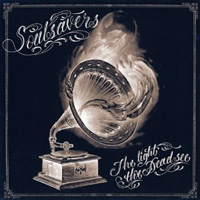 Soulsavers: The Light the Dead See (Mute, 5/22/12)
Soulsavers: The Light the Dead See (Mute, 5/22/12)
“Take Me Back Home”
Soulsavers: “Take Me Back Home”
For more than two decades, Depeche Mode front-man Dave Gahan was content being the impassioned voice behind the songs of bandmate Martin Gore, whose edgy, genre-stretching synth pop dominated the ’80s club scene and landed unapologetically on ’90s alternative-rock radio. But since 2003, the singer’s distinctive baritone also has served a more personal purpose, fueling the release of his first two solo albums and, in May, his first collaboration with English production duo Soulsavers.
For Gahan, the evolution may have been inevitable.
“When you’re in a band as good as mine for so many years, I think if you’ve got any ideas about writing, you go more and more into the closet, to be quite honest, because you’re working with somebody that’s writing these great songs,” he says. “I needed to challenge myself as an artist and, creatively, I felt like I’d done the best I could and wasn’t getting the same kind of thrill, if you will, out of performing somebody else’s songs. For a long time, that really felt very natural. And then it just didn’t.”
Gahan’s latest effort fronting Soulsavers on its fourth record, The Light the Dead See, finds him in a temporal state, as the band takes another step away from its origins in electronica. Coming off a two-album run with former Screaming Trees vocalist Mark Lanegan, Soulsavers founders Rich Machin and Ian Glover sculpted around Gahan’s lyrics and vocal melodies to create their most live-sounding record since their third release, 2009’s Broken. Lush, orchestral, and full of guitars, the album opens without Gahan’s voice, setting the scene instead with the dramatic western-film sounds of Italian composer Ennio Morricone and the entrancing string patterns of American composer Philip Glass. Gahan is unmistakable when he enters on the second track, the moody rocker “In the Morning,” and the rest feels deeply personal.
The record wasn’t necessarily meant to be. Initially, Gahan and Machin say, they just wanted to experiment each other’s ideas after Soulsavers supported Depeche Mode on tour in 2009. Communicating largely by E-mail and phone, Machin provided Gahan with musical building blocks, and Gahan sent back his parts, which were open for Soulsavers’ interpretation. “I never dreamt what he provided to me would be as realized as it was,” says Machin, who also has collaborated with Mike Patton, Will Oldham, and Jason Pierce of Spiritualized, among others. “We were both on the same page with exactly what we wanted straight away. There was a kind of chemistry.”
For Gahan, who recorded mostly in solitude, it was an intimate experience.
“I had no else to bounce off or anything,” he says. “I was left to myself and my own thoughts and feelings, and they just came pouring out.”
“When we started writing together, there was no talk of making a record,” he adds. “I mean, obviously, the back of your mind is going to that place. I think after about six or seven songs, I may have had a conversation with Rich where I said, ‘You know, I guess we’re making a record.’ It was around that time that it seemed like what we were doing together was important.”
Machin lists Violator, Songs of Faith and Devotion, and Ultra among his favorite Depeche Mode records, but he says that he tried to avoid those influences, drawing more inspiration from watching Gahan sing on tour. “Hearing him sing in a live environment is very different than the studio world,” Machin notes. “I kind of approached it from that live-environment exposure to watching him sing and just kind of wanting to have that sound with a more traditional form of band underneath it.”
Lyrically, some of Gahan’s material does recall that back-to-back trio of Depeche Mode albums. On its face, for example, the song “Presence of God” feels familiar simply because of its subject matter, even if it’s wildly different from “Personal Jesus.”
“I’m certainly not afraid to use the word ‘God,'” says Gahan, who doesn’t consider himself religious. “And in that particular track, I chose it because it’s the easiest one to recognize, and it always gets everybody to pick up their ears. But for me, it’s a sense when you know there’s something much larger going on around you, and you’re noticing through somebody else or something else a situation you’re in. But you certainly get a grander scale of things that is beyond your insignificant self.”
A Soulsavers tour with Gahan isn’t immediately planned, but both he and Machin say they are open to working together again. Gahan, who grew up in Essex, England, and lives in New York, is now back in his home state recording Depeche Mode’s 13th record, a process that he laughingly describes as “certainly much longer” than what he did with Soulsavers. Since 2005, he has contributed songs more frequently to the band, and they work through them together.
“It’s interesting because, I feel certainly with the writing, you’ve got to kind of stick up for what you believe in,” Gahan says. “But I really do enjoy the process of somebody else there listening to what you’re doing, and they may have a completely different angle at it.”


Now a magazine contributor. Great job, Josh!
Thanks, pretty exciting!
I guess so!!! So proud of you – again.